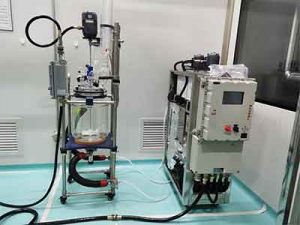industrial air cooled water chiller
Industrial Air-Cooled Water Chillers: A Comprehensive Guide
Introduction
Industrial air-cooled water chillers are essential for maintaining precise temperature control in various industrial processes. These systems use ambient air to remove heat from water, which is then circulated to cool equipment or processes. Unlike water-cooled chillers, air-cooled systems do not require a separate cooling tower, making them ideal for locations with limited water resources. This article explores the working principles, components, advantages, and applications of industrial air-cooled water chillers, providing a detailed understanding of their functionality and benefits.

Working Principle
Industrial air-cooled water chillers operate on the vapor compression refrigeration cycle. The process begins with the evaporation of refrigerant in the evaporator, where it absorbs heat from the water. The refrigerant vapor is then compressed by the compressor, increasing its temperature and pressure. The high-pressure vapor moves to the condenser, where it releases heat to the ambient air and condenses into a liquid. Finally, the liquid refrigerant passes through an expansion valve, reducing its pressure and temperature before returning to the evaporator to repeat the cycle.
Key Components
Compressor: The heart of the system, responsible for compressing the refrigerant and circulating it through the cycle.
Condenser: Uses fans to dissipate heat from the refrigerant to the ambient air.
Evaporator: Absorbs heat from the water, cooling it for circulation.
Expansion Valve: Regulates the flow of refrigerant, reducing its pressure and temperature.
Control System: Monitors and adjusts the chiller’s operation to optimize performance.
Advantages
Water Efficiency: Does not require a continuous water supply, making it suitable for areas with water scarcity.
Compact Design: Easier to install and maintain compared to water-cooled systems.
Lower Initial Cost: Typically less expensive to install due to the absence of cooling towers and associated piping.
Versatility: Suitable for a wide range of industrial applications.

Applications
Industrial air-cooled water chillers are used in various sectors, including:
Manufacturing: Cooling machinery and processes in industries such as plastics, metalworking, and automotive.
Food and Beverage: Maintaining temperatures for production and storage of perishable goods.
Pharmaceuticals: Ensuring precise temperature control for drug manufacturing and storage.
HVAC Systems: Providing cooling for large commercial and industrial buildings.
Data Centers: Managing heat generated by servers and IT equipment.
Maintenance Tips
Regularly clean the condenser coils and fans to ensure efficient heat dissipation.
Monitor refrigerant levels and check for leaks to maintain optimal performance.
Inspect the compressor and electrical connections for signs of wear or damage.
Schedule professional maintenance to address potential issues and extend the chiller’s lifespan.
Use predictive maintenance technologies, such as IoT sensors, to monitor system health and prevent failures.
Energy Efficiency Considerations

Energy efficiency is a critical factor for industrial air-cooled water chillers. Implementing energy-saving measures, such as variable speed drives, high-efficiency compressors, and regular maintenance, can significantly reduce energy consumption and operational costs. Additionally, selecting chillers with advanced control systems can optimize performance based on cooling demand.
Environmental Considerations
The environmental impact of industrial air-cooled water chillers can be minimized by using eco-friendly refrigerants with low global warming potential (GWP). Regular maintenance and proper disposal of refrigerants also contribute to sustainability. Businesses are encouraged to adopt energy-efficient technologies and practices to comply with environmental regulations and reduce their carbon footprint.
Conclusion
Industrial air-cooled water chillers are vital for maintaining precise temperature control in various industrial applications. By understanding their working principles, components, and maintenance requirements, businesses can optimize the performance and sustainability of their cooling systems. Whether for manufacturing, food processing, or HVAC systems, air-cooled water chillers offer a reliable and efficient solution for industrial cooling needs.
Related recommendations
Features of Industrial Chillers
1304Features of Industrial Chillers Industrial chiller is a cooling water device that can provide constant temperature, constant current and constant pressure. The working principle of the chille...
View detailstypes of water chiller
191Introduction to Water ChillersWater chillers are refrigeration systems designed to cool water, which is then circulated to absorb heat from spaces, equipment, or processes. They play a critical r...
View detailsprocess chillers manufacturers
354Process Chillers Manufacturers: A Comprehensive GuideProcess chillers manufacturers are companies dedicated to the design, production, and distribution of chillers used in industrial and commerci...
View detailsindustrial chiller plant
478Understanding Industrial Chiller Plants Industrial chiller plants are sophisticated refrigeration systems designed to remove heat from a process or facility, thereby maintaining optimal tempera...
View details
 LNEYA Chiller
LNEYA Chiller






HelloPlease log in